Hello fellows,
It is an honour to share with you one of the distinguishing features of my tradition, Asante funeral rites (Ayiyɔ).
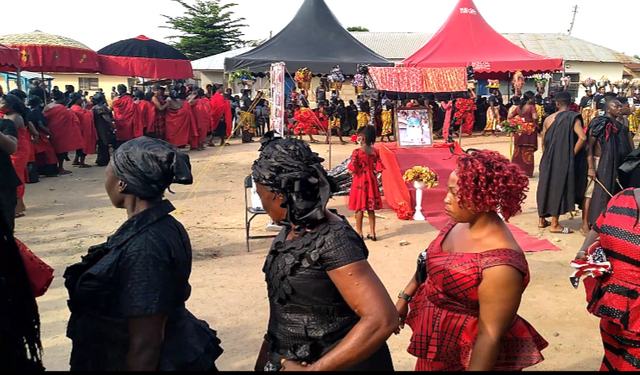
Synpathizers greeting at the family gathering
Image source
I am an Asante and we are more interested in giving the best out of us when it comes to saying our final farewell to a person we once lived with.
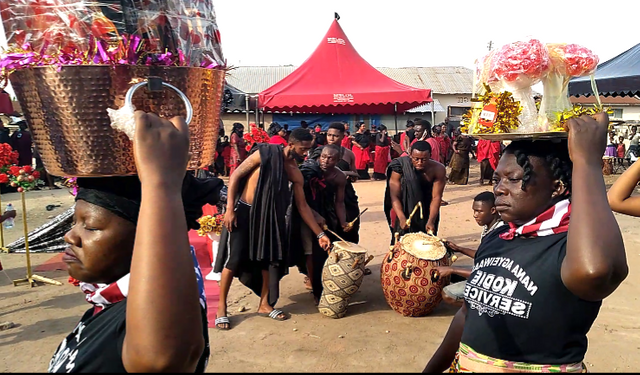
In-laws showcasing their gifts
Image source
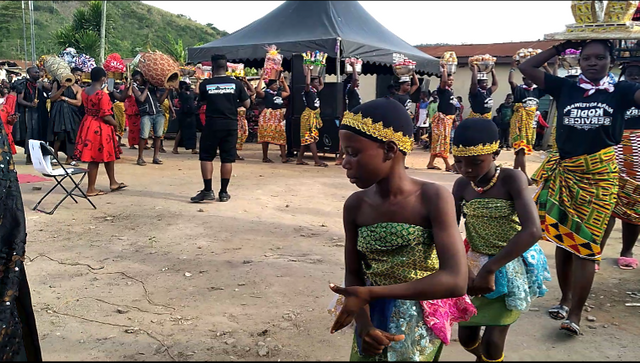
In-laws gifts
Image source
When one dies in an Asante environ, the corpse is taken to the mortuary (previously the dead person was placed on a pot in a room filled with some preservative plants, like akyeampɔn to drain all liquids and preserve the body).
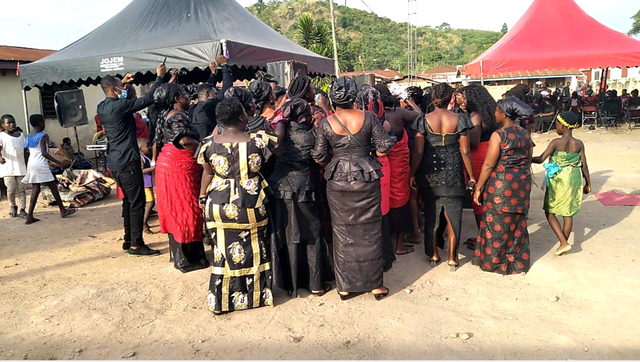
Dancing by women
Image source
A week after the persons death, the one week rite is performed to help set date for the final funeral rites and for those afar to get the chance to say their final words.
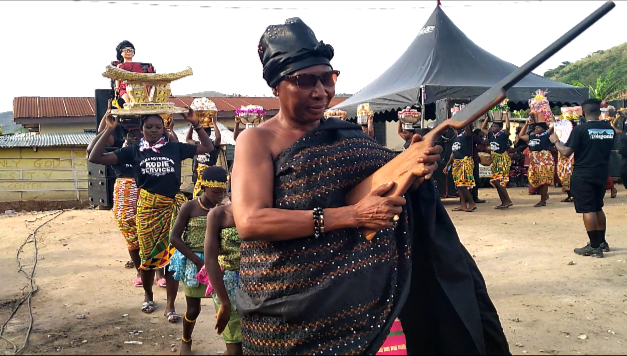
Traditional queenmother displaying her love for my grandmother
Image source
When the set date is due, the first thing is the preparation of a place to house the body for friends and families to say their final farewell.
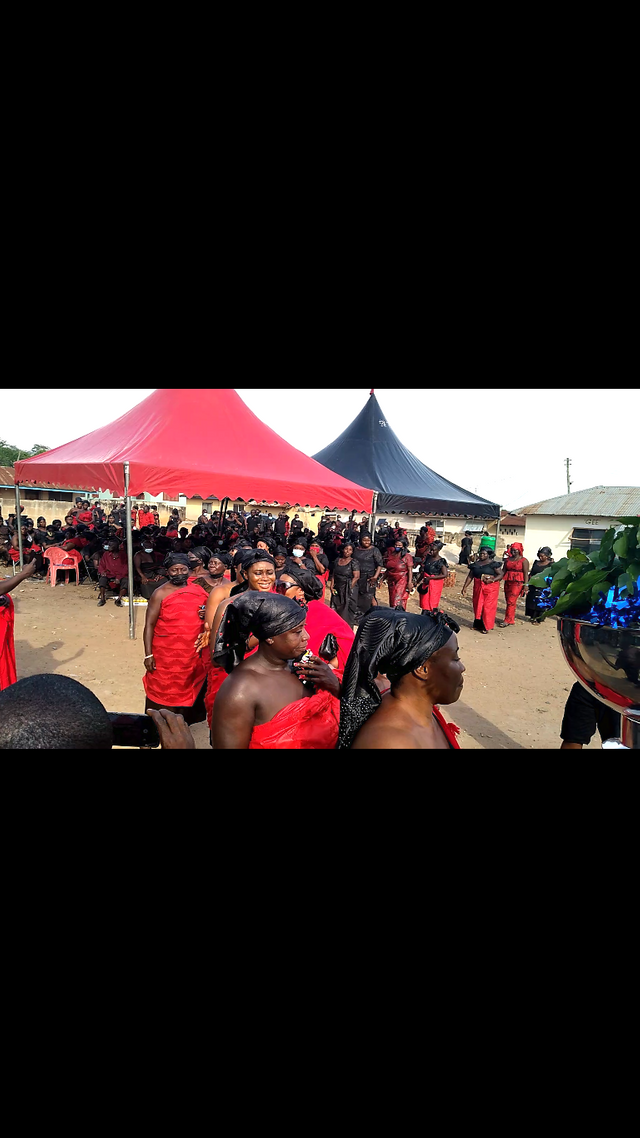
In-law greeting
Image source
It is mostly three days for the funeral rites of a common community member and five days for a king, queen or leaders of the traditional council.
Traditionally, we keep awake a night before the burial (yɛ siri pɛ) and the elderly members of the family fast (di abuada).
.png)
Traditional rulers
Image source
After the place is set, the corpse is bathed with hot water and various preservatives by some family members depending on the dead person.
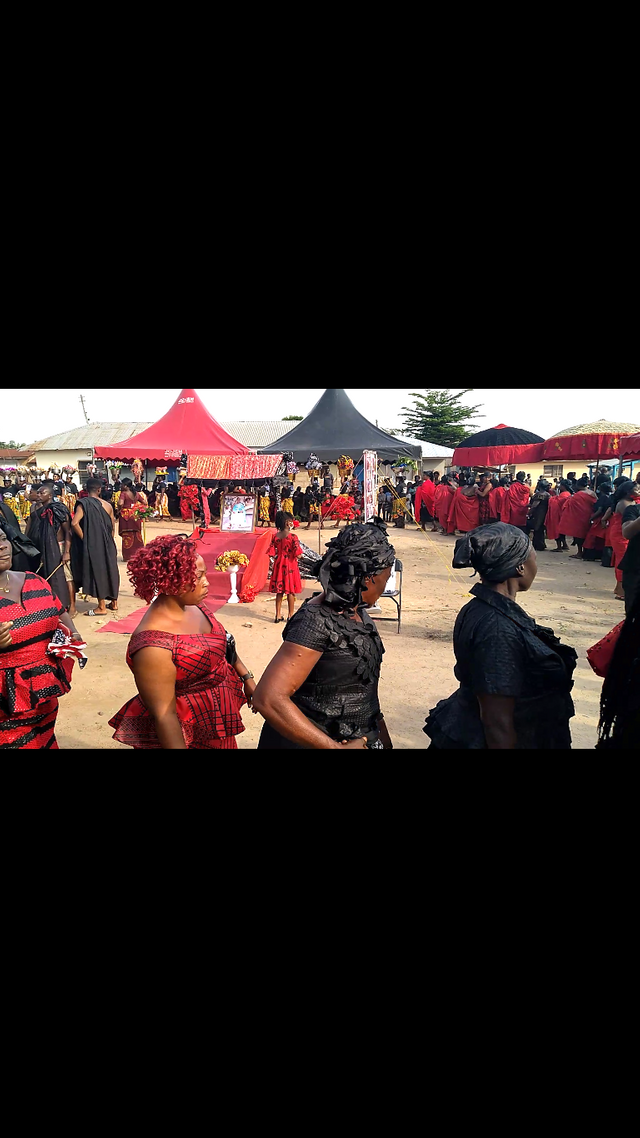
Sympathisers
Image source
In the process of the funeral, libation is poured to seek for protection for the rest of the family, for a place amongst the ancestors for the dead person and agaisnt any person or spirit wishing for the downfall of the family.
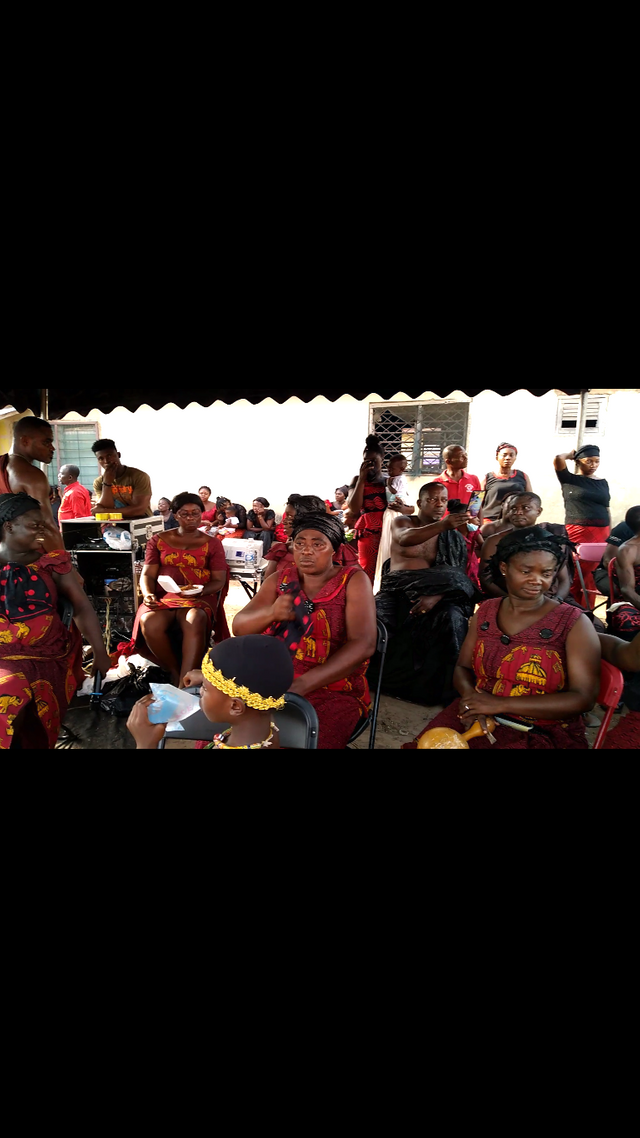
Nwomkorɔ kuo
Image source
The corpse after the hot water bath is clothed and placed on the beautifully decorated stage for first the widow or widower, followed by the elders of the family, other family members, friends, and enemies to file past the corpse wailing and crying their hearts out.
.png)
In-law
Image source
As the corpse is on the stage, people donate monies, drinks, matches, water, handkerchiefs, clothes, and many more as 'adesiedeɛ' (For the dead person to use in the world he/she is entering since we believe there is another world after this).
.png)
Image source
Some family members
You won't make it to an Akan, particularly Asante funeral without hearing a cry like, 'bue bue! me ne wobɛkɔ'.
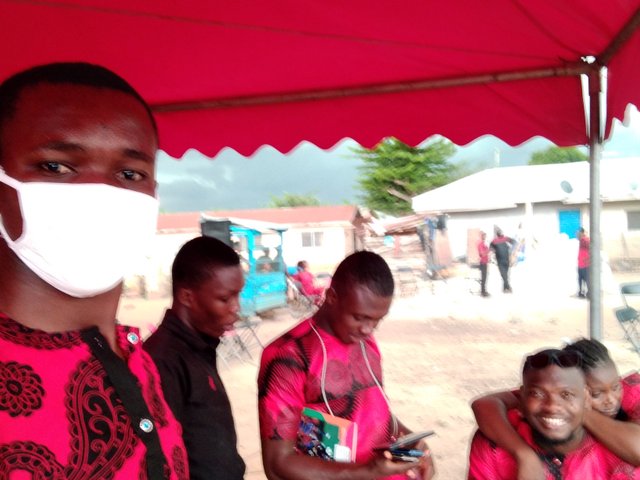
Myself and brothers
Image source
If the person was a christian, the church gets the chance to pray and sing for the transition of the dead person into the next world.
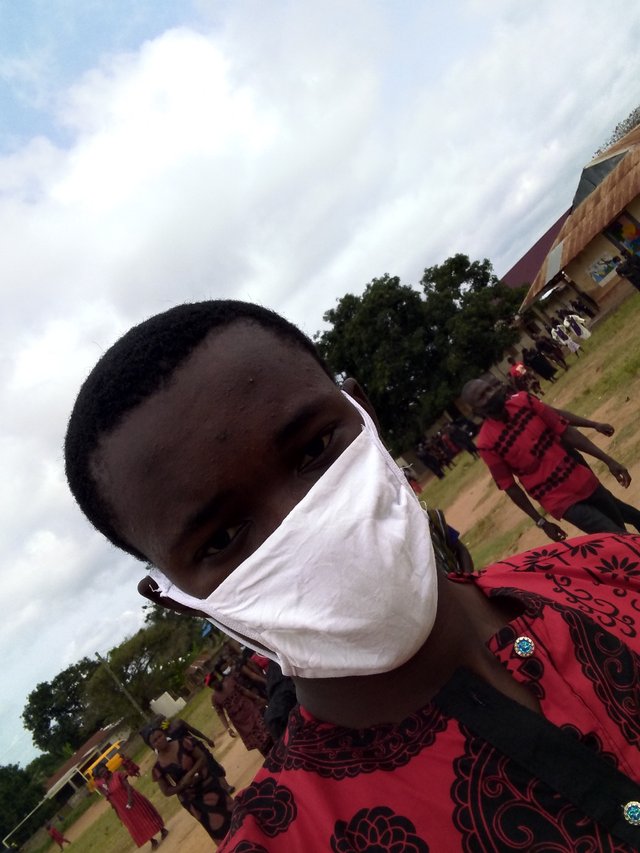
Escorting corpse to the cemetery
Image source
After everything, libation is poured to clear the way for the dead person to be buried. The body is transferred into a casket bought by the children in the case the dead person had some or the extended family members.
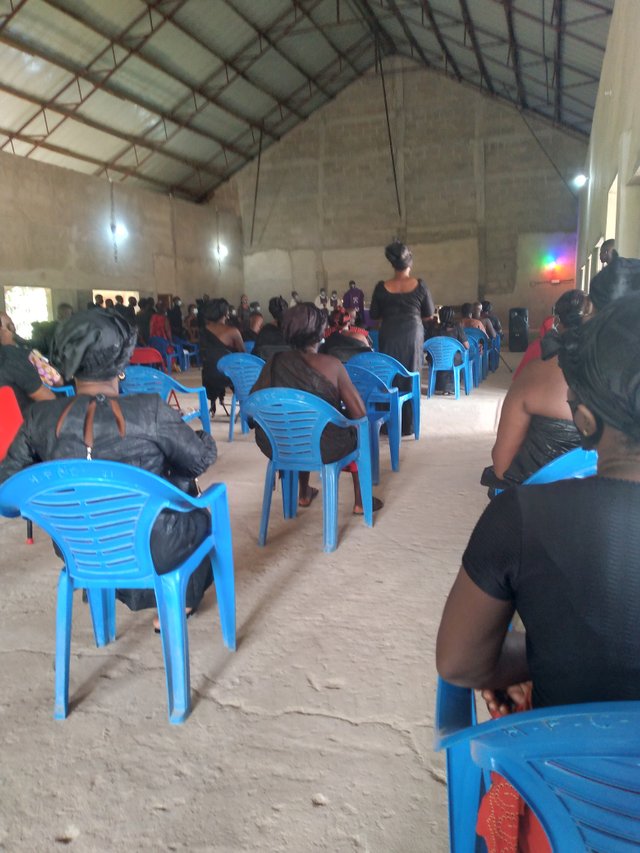
Thanksgiving service
Image source
The body after all rituals person is taken to the cemetary 'asieɛ' for burial. At the cemetary, libation is poured with other rituals and the body is buried nicely. Crying is very high at this point since that is the last chance for the dead person to hear you. But an interesting thing is, unlike the cry when the body is on the platform at home, the cries here changes to 'bue bue!! wode me gyaa hwan nie'.
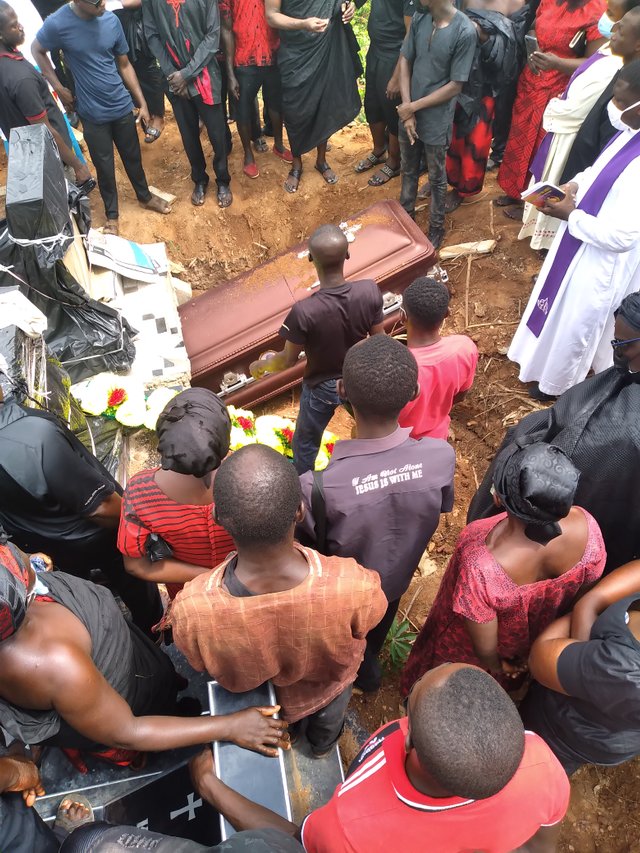
Image source
Last prayer session
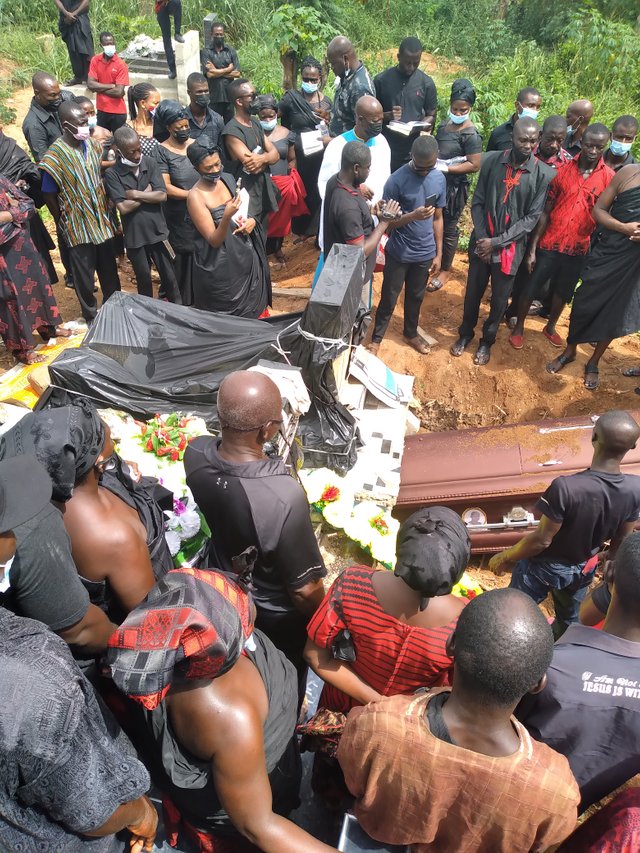
Burial service
Image source
All sympathisers return home sorrowful. We all come and prepare for the family gathering which mostly starts from noon.
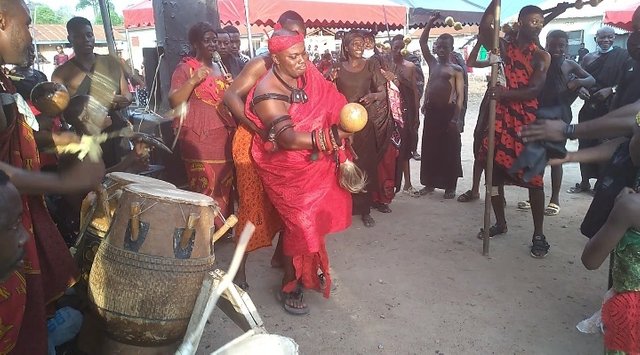
Image source
Cultural dance display by the king of Dawu
All friends and family sit to celebrate the life of the dead person, share advice, meet old and new friends and show love to the dead person or his/her family members through monies (nsawabɔdeɛ).
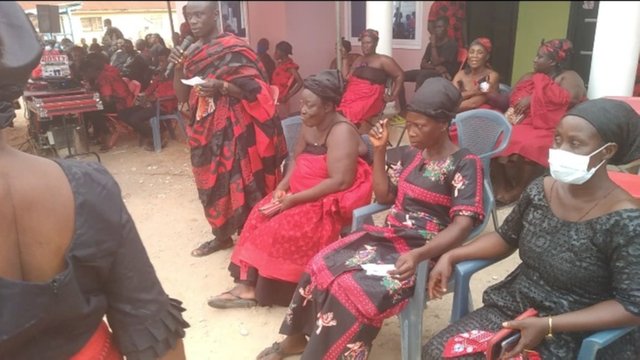
**Announcement of 'nsawabɔdeɛ'
Image source
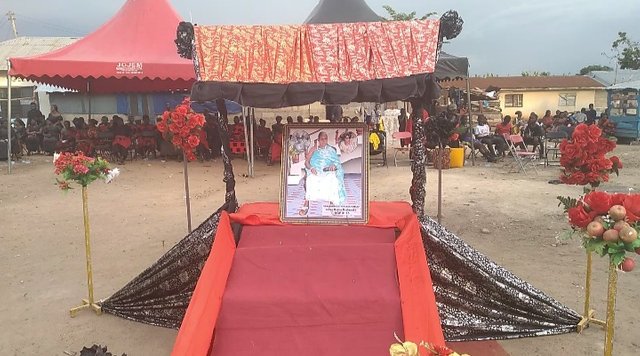
Image of the dead person displayed
Image source
Under the canopies 'mpata', family members gather at one side for sympathisers to come and greet them. The greeting is done from left to right. Food and drinks are giving out to all sympathizers. Black and red clothes dominates the funeral rites on the firat day while white clothes dominates on the second day.
Thanksgiving service is done for a Christian at his or her church premises on the day after the burial service and family gathering is continued brought to a close at 6:00pm.
The next day after the funeral rites is mostly for the family members to meet to make accounts, reconciliations and settle other matters.
This is how funeral rites are performed in my community.
Thanks for your attention.
Cc:
@nattybongo
@mcsamm
@njaywan
@pennsif
@stephenkendal
@tanhunter254
Nice write up. Thanks for sharing 👍
Downvoting a post can decrease pending rewards and make it less visible. Common reasons:
Submit
You're welcome bruh
Downvoting a post can decrease pending rewards and make it less visible. Common reasons:
Submit
Thanks for another beauty of the rich Akan culture. It's pretty to share. This is our heritage
Downvoting a post can decrease pending rewards and make it less visible. Common reasons:
Submit
You're welcome and thanks for your continuous motivation.
Downvoting a post can decrease pending rewards and make it less visible. Common reasons:
Submit
The Asante's have a rich culture and I'm proub to be an Asante. Thanks for presenting our culture to the world Kofi
Downvoting a post can decrease pending rewards and make it less visible. Common reasons:
Submit
You're welcome boss.
It is great to be a part of the family
Downvoting a post can decrease pending rewards and make it less visible. Common reasons:
Submit
Wow this is culture
Downvoting a post can decrease pending rewards and make it less visible. Common reasons:
Submit
Thanks
Downvoting a post can decrease pending rewards and make it less visible. Common reasons:
Submit
Very well elaborated, very detailed and fun to read. Your image source takes me to what3words though and i do not understand, is it that the images are yours and you are showing us the location?
Downvoting a post can decrease pending rewards and make it less visible. Common reasons:
Submit
Yes please, if wrong, suggest the right way for the corrections to be made. Thank you.
Downvoting a post can decrease pending rewards and make it less visible. Common reasons:
Submit
Every culture has its own way of honoring the dead, and it’s always interesting to see those differences. In our family, when we lost my grandmother, we wanted to keep things simple but still have a place to remember her. We decided on a flat grave marker, which felt right for us. It gave us a spot to visit without needing a big, elaborate site. Grave Markers like that can offer a peaceful way to honor someone’s memory, while also fitting in with different traditions. It’s nice to see how these customs, whether simple or detailed, keep the memories of our loved ones alive.
Downvoting a post can decrease pending rewards and make it less visible. Common reasons:
Submit